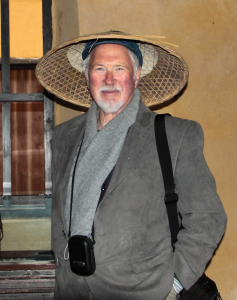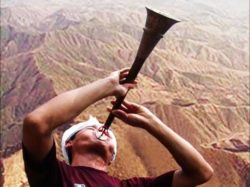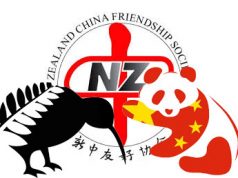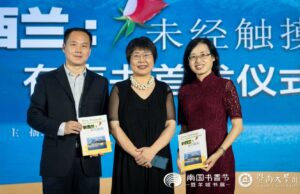Dr Les Molloy will speak on “Travels in the Mountains and Deserts of China’s ‘Western Region’”
Dr Les Molloy is a natural heritage consultant with a background in scientific research (DSIR) and in national park and protected area identification and management (NZ Department of Conservation). He is the author of 6 books on different aspects of New Zealand’s natural environment.
For the past 20 years Les has travelled widely in China and other countries in East Asia and Central Asia, including Pakistan, Mongolia, Japan, Russia (Siberia) and the ‘stans’ of the former USSR. Much of this travel has been on behalf of UNESCO and the International Union for the Conservation of Nature (IUCN), to evaluate a number of remote natural areas nominated by these countries for World Heritage status. During this period he has made many visits to China’s largest region – Xinjiang –and the high mountain ranges – Karakoram, Kunlun, Pamir and Tian Shan – on its borders. The Xinjiang region was known Xiyu [meaning ‘Western Region’], under the Han Dynasty, Huijiang [meaning ‘Muslim Frontier’] during the Qing Dynasty, before being renamed Xinjiang [meaning ‘New Frontier’] in the 1880s.
Xinjiang is mainly sparsely populated deserts and mountains, spanning over 1.6 million km2, that is, about one sixth of China’s territory. Xinjiang borders Tibet and India’s Leh District to the south; Qinghai and Gansu provinces to the southeast; Mongolia to the east; Russia to the north; and Kazakhstan, Kyrgyzstan, Tajikistan, Afghanistan, and Pakistan to the west. It is home to China’s main Muslim population, a diverse and colourful assemblage of the Uyghur, Hui, Kazakh, and Kyrgyz minority cultures.
In the 2000 years since the area first came under Chinese dominion in the Han Dynasty, it has had a very fascinating but turbulent political history, including ethnic conflicts which have continued up to the present day. In geographical circles it is most famous for its relics of the Silk Road which flourished during the Han and Tang Dynasties, and for the 3600 year old Loulan mummies from the Tarim Basin and Desert of Lop.
Subtitled “the remarkable natural and cultural heritage of Xinjiang and the lands around the ancient Silk Road”, Les’s illustrated talk will cover his travels over the years in the mountains and deserts of both Xinjiang and its neighbours, as well as Xinjiang’s ancient cultural heritage associated with the Silk Road.
Wednesday, 19 September 2012, at 5:45 pm in Connolly Hall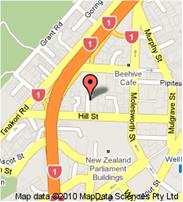
Guildford Terrace, off Hill Street, Thorndon, Wellington (see map)
(Car park up Guildford Tce beside Hall)
An optional Chinese buffet meal, supplied by the Fujiyama Café, will follow the meeting at 7 pm. Orders for the $11.00 meal (please pay at the door) will be taken up till 6 pm. If you think you may be arriving late, please let the Secretary know in advance.
ALSO COMING UP THIS MONTH (see below for details)
1, 8, 15, 22 September, 3:15pm Mandarin Corner, 24 Kelburn Parade
23 September, 6:30pm National Day Dinner, Grand Century
27 September, 7:00pm Chinese Film, 101 Wakefield St
29 September, 3:15pm Mandarin Corner, 24 Kelburn Parade
LAST MEETING REPORT: Counsellor Optimistic about China’s Economic Growth (by Joy Bickley Asher)
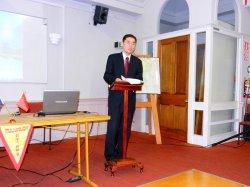 In Beijing, China’s leaders are conceding that there may be some problems ahead for China’s economy. These doubts are apparently not shared by Counselor Cheng Lei from the Chinese Embassy. Speaking from a personal perspective Counselor Cheng Lei believes that China’s economy will continue to grow and that both China and New Zealand will continue to benefit from the Free Trade Agreement. These were the main messages I took away from Counselor Cheng’s address to a small but attentive audience at the August meeting of the branch.
In Beijing, China’s leaders are conceding that there may be some problems ahead for China’s economy. These doubts are apparently not shared by Counselor Cheng Lei from the Chinese Embassy. Speaking from a personal perspective Counselor Cheng Lei believes that China’s economy will continue to grow and that both China and New Zealand will continue to benefit from the Free Trade Agreement. These were the main messages I took away from Counselor Cheng’s address to a small but attentive audience at the August meeting of the branch.
Counselor Cheng Lei has been the deputy chief of mission at the Chinese Embassy in New Zealand since December 2010. Prior to that he held a number of overseas posts most notably in Washington, D.C. (2001 to 2005) where he was in charge of bilateral political relations. He studied at Canton Foreign Studies University in China and at the School of Advanced International Studies at the Johns Hopkins University. He graciously agreed to talk about China’s economy and China-NZ trade relations since the signing of the Free Trade Agreement in 2008.
Counselor Cheng agreed that at a global level the economic outlook appears gloomy. Regarding China’s economic performance he pointed out that there had been a recent drop in growth rate from 8.1% to 7.6%. Doomsayers saw this as an indication that China’s economy was following the same downward track as that of other superpowers. Not so, according to Counselor Cheng. He listed a number of reasons for continued optimism including the planned management of this anticipated variation in economic growth, China’s position as the world’s biggest exporter and the second biggest economy and China’s possession of favourable levels of both capital and labour.
The Free Trade agreement, in Counselor Cheng’s view, has brought considerable benefit to both New Zealand and China. Over 60% of New Zealand imports are from China. China imports goods worth $13.4 billion dollars from New Zealand including dairy, forestry, processed food and manufactured goods. There has been a rise of 34% in the number of tourists to visit New Zealand since 2008. Chinese investment within New Zealand is the least developed aspect of the Free Trade Agreement. China’s policy regarding overseas investment was based on the aim of investing globally, merging into local communities and making a contribution. New Zealand also invested within China and there were a number of enterprises within China that were 100% owned by New Zealanders.
MEETING DATES FOR THE REST OF 2012
Wed 17 Oct Dr Andrew Butcher, “In Pleasant Places: The Story of the Duncan Family in China in the 1940s”
Wed 21 Nov Her Worship Celia Wade-Brown, Mayor of Wellington, “Mayoral Delegations to China”
NEW MEMBERS
A warm welcome to new members David Lai and Malcolm Stayner.
MANDARIN CORNER 汉语角 3.15pm Saturdays during school terms
Room 103, 24 Kelburn Parade, Victoria University of Wellington. There is a topic for each session to stimulate interest (may change subject to unforeseen circumstances). All welcome. Gold coin donation.
Five sessions in September 2012:
1 September – Today In History 历史上的今天
8 September – “Life with Herders” – A video show & talk by Ruifei Tang, PhD Candidate in Environment Studies, VUW
15 September – Women’s Suffrage Day 妇女投票权日
22 September – Adorable Giant Panda 可爱的大熊猫
29 September – Mid Autumn Festival Poetry Reading & Moon Cake Tasting 中秋节诗歌朗诵及月饼品尝
Contact: Ellen Yang 杨川, 473-7558, 027-4756888, [email protected]
CHINESE FILM 中国电影 Date: Thursday 27 September Time: 7.00pm
Venue: Committee Room One, Wellington City Council, 101 Wakefield Street. Gold coin donation.
7pm – Documentary, Chinese Food Culture, 7.30pm – Feature Film, Waves, 浪花一朵朵 [2006]
Director: Tao Li陶理 Stars:Ken, Rose, Lin, Jane
A Documentary by Tao Li, Hutt Valley High School ESOL teacher on the life of four international students, Waves provides us a clear picture of the overseas life of Chinese international students, which is lovely, colourful and special. http://movie.douban.com/subject/3293675/
With Support from Confucius Institute, Victoria University of Wellington. http://www.victoria.ac.nz/ci/
The suona, known as the Chinese oboe or trumpet, is the loudest of the traditional instruments, with a bright piercing sound. It is common in traditional bands playing at outdoor weddings, festivals, parades and funerals, especially in rural North China. Because of its rural popularity, the suona has the reputation of a rather low-class folk instrument. But it also can be played with subtlety, expressing the human voice and a range of emotion. Frequently played as a bright, high-pitched instrument, it is known for evoking the singing of hundreds of songbirds. Suonas of different length have different sounds and thereby convey different feelings. Because the seemingly simple eight-hole instrument can be difficult to master, it has been called the “eight-eyed monkey”. Its modern version has keys and is easier to play. The suona dates back to the Han Dynasty (206 BC-220 AD) and probably originated in Central Asia. It holds an important position in the folk music culture in north China, particularly in the province of Shandong. The suona has a conical wooden body, similar to that of the European oboe. However, it uses a brass or copper mouthpiece to which a small double reed is affixed, possessing a detachable metal bell at its end. Today, the suona is made in several sizes. Beginning in the mid-20th century, modernized versions of the instrument were developed in China. These have keys similar to those of the European oboe so that they allow for the playing of chromatic notes and equal-tempered tuning. These modernized versions are widely used in the woodwind sections of Chinese traditional instrument orchestras. (From Cultural-China.com.)
IDIOM OF THE MONTH (from George Mills)
讀萬卷書不如行萬里路 dú wàn juǎn shū bù rú xíng wàn lǐ lù
Practical experience is more useful than theory
(Literally: Reading ten thousands of books is not as useful as travelling ten thousand miles)
CONFUCIUS INSTITUTE NEWS (from the CIVUW team)
The Confucius Institute at VUW is proud to support two Chinese speech competitions in September. The Wellington Chinese Language School is organising a Chinese speech competition on Saturday 8th (preliminaries) and 15th September (final) at Kelburn Campus. Entry is free and open to all Chinese learners. Registration closes on 2nd September. Read more: www.victoria.ac.nz/ci/news-events/events.aspx#Wellington-speech
The Manawatu Chinese Community Trust is organising its popular annual Speech Competition and Cultural Day in Palmerston North on Sunday 23rd September. Entry is free and open to all Chinese learners. Registration closes 15th September. www.victoria.ac.nz/ci/news-events/events.aspx#Speech-competition-Palmerston-North
Registration for the Chinese Proficiency tests (HSK) is open and will close in November. These tests are essential tools to determine student’s Chinese proficiency level and useful qualifications for further language study in China and universities worldwide. The test will take place on 2nd December at the Confucius Institute. The Institute will also offer a series of workshops for test candidates. Email [email protected] to register. Read more: www.victoria.ac.nz/ci/courses-and-programmes/language-proficiency-tests.aspx
The Confucius Institute at VUW is proud to host the ‘Intercultural Communicative Language Teaching’ workshop organised by Wang Yu, National Language Adviser China at ILEP (International Languages Exchanges and Pathways). iCLT is a new trend in foreign language teaching and learning and also promoted by the New Zealand Ministry of Education. This workshop will take place at the Confucius Institute on Saturday 8th September from 9.00am until 3.30pm. RSVP to [email protected] is required. Read more: www.victoria.ac.nz/ci/news-events/events.aspx#iCLT
LEGENDS AND TALES FROM ANCIENT CHINA – The NZCLA’s Bilingual Chinese Reader (by Mary Gray)
I have been putting forward the idea that any intellectually curious person who in the 20th century felt that they should know at least some French, now in the 21st century should have some acquaintance of the Chinese Language and Culture. The NZCLA’s bilingual Chinese reader, Legends and Tales from Ancient China, can do this for you because a recent VUW PhD thesis has brought a new idea to the acquisition of foreign languages. It emphasizes how important is a knowledge of the sounds of a language before any attempt is made to study the language. In the book each of the 25 stories is read aloud on the CD-ROM in Putonghua (Mandarin), Cantonese, and English. Before you look at the printed book, listen to the sounds of Chinese so that your brain knows what new vocal sounds it is going to have to cope with. You can put it on while you are doing other things – washing dishes, even studying something else, getting dressed – anytime that you have the means of listening to a CD-ROM. After a few sessions just listening, you are then ready to open the book and perhaps dispel some of the misconceptions people have about how difficult it is to learn Chinese.
You will receive a letter explaining how smart the book is when you buy it at a modest cost of $25. Copies will be available at all NZCFS meetings in Wellington. Contact Mary Gray ([email protected]).
NATIONAL DAY DINNER – Sunday 23 September, 6:30pm
The 2012 National Day Dinner, in association with the Wellington Chinese Association will take place at the Grand Century in Tory St. NZCFS has been allocated 30 tickets for this, and these will be allocated on a first-come first-served basis. Please contact Bernie Richmond [email protected] for further details and to reserve a place.
VISIT FROM SHANGHAI CPAFFC DELEGATION
The following day a group of 6 people from the Shanghai CPAFFC (Youxie) will be in Wellington on Monday 24th September for a dinner with NZCFS Wellington Branch Members. Please contact Bernie Richmond [email protected] for further details and to reserve a place.
GROWING CONFIDENCE BY CHINESE CONSUMERS, however still more likely to save than spend
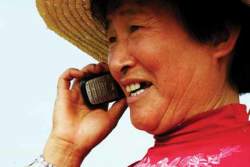 Despite slowing economic growth, Chinese consumer confidence during the first quarter of 2012 was at its highest level since 2005. According to Nielsen’s Global Survey of Consumer Confidence and Spending Intentions, China ranked the fourth most optimistic among the survey’s 56 country participants. Nielsen Greater China’s President Yan Xuan credited the PRC government’s support for small- and medium-sized enterprises—including credit expansion, domestic consumption and demand-growing policies, and management of the real estate bubble—for Chinese consumers’ confidence. The survey also showed that rural consumers made up China’s most confident consumer segment. Rural consumer confidence has been increasing for four straight quarters. In addition, consumer goods spending in China’s rural areas have increased more than the national average. Xuan noted central government policies, such as providing subsidies for farmers’ health insurance and plans to increase investment in agriculture and rural areas, also help explain the segment’s confidence. Rural consumers and second-tier cities accounted for the largest uptick in spending during this same quarter; consumer confidence in tier-one, -three, and -four cities remained the same. While Chinese consumers are optimistic about the job market and higher income expectations overall, their willingness to spend remained flat. The Nielsen survey showed that 49 percent of those consumers would rather put spare cash directly into savings or education for their children, up from 41 percent in the last quarter of 2011. (China Business Review Jul-Sept 2012, edited.)
Despite slowing economic growth, Chinese consumer confidence during the first quarter of 2012 was at its highest level since 2005. According to Nielsen’s Global Survey of Consumer Confidence and Spending Intentions, China ranked the fourth most optimistic among the survey’s 56 country participants. Nielsen Greater China’s President Yan Xuan credited the PRC government’s support for small- and medium-sized enterprises—including credit expansion, domestic consumption and demand-growing policies, and management of the real estate bubble—for Chinese consumers’ confidence. The survey also showed that rural consumers made up China’s most confident consumer segment. Rural consumer confidence has been increasing for four straight quarters. In addition, consumer goods spending in China’s rural areas have increased more than the national average. Xuan noted central government policies, such as providing subsidies for farmers’ health insurance and plans to increase investment in agriculture and rural areas, also help explain the segment’s confidence. Rural consumers and second-tier cities accounted for the largest uptick in spending during this same quarter; consumer confidence in tier-one, -three, and -four cities remained the same. While Chinese consumers are optimistic about the job market and higher income expectations overall, their willingness to spend remained flat. The Nielsen survey showed that 49 percent of those consumers would rather put spare cash directly into savings or education for their children, up from 41 percent in the last quarter of 2011. (China Business Review Jul-Sept 2012, edited.)
WCC/WXA CITIZEN’S DELEGATION TO FUJIAN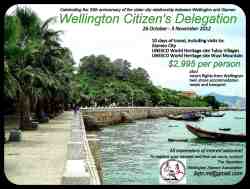
The Wellington City Council and Wellington Xiamen Association are organising a trip to Xiamen City and Fujian Province from 26 October to 4 November 2012. The purpose of the trip is to celebrate the 25th anniversary of Wellington and Xiamen’s sister city relationship by enhancing people-to-people connections between citizens, and developing Wellingtonians’ understanding of Xiamen. The cost of the trip (including return international airfares, tours, meals, twin share accommodation and domestic transport in China) will be $2,995. This is based on a group size of 15. Please email [email protected], Secretary of the Wellington Xiamen Association with an expression of interest, or with any questions you have by Wednesday 12 September.


